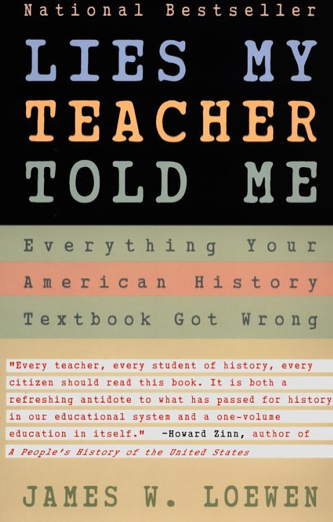What's So Hard About Teaching Truth?
Wow, sometimes post topics just fall into my lap -- or, fall into my Facebook, to be more accurate. Seriously, what did we all socially write about before people's Facebook comments, status updates, and links?
 This one comes courtesy of a simple comment about "Columbus" (this being, ya know, Columbus's big DAY and all....)
This one comes courtesy of a simple comment about "Columbus" (this being, ya know, Columbus's big DAY and all....)
A friend status-ed about loving Columbus. So, I bit, and commented that I hope my friend loves the day off and not actually what Columbus did. That led to the response that the teacher does teach a socially responsible unit on Columbus (yay!! Give it up for one more teacher who teaches the truth!). Another person then asked what Columbus did. I, unable to resist, simply stated that "Columbus gets credit for discovering a place that already had people, language, culture, traditions, etc. That would be like me walking into your apartment, saying that I founded it, and then making you go get me a drink."
A response came along -- the kind you hope for when you're in a blogging rut -- with something like this: "Yeah, but how much violent-invading history are we really gonna teach 3rd graders, or their parents, who want everything to be sugary and nice?" I actually agreed here because I thought the commenter was heading in the "yes, and therefore we shouldn't teach Columbus=Discoverer". But, alas, the commenter wasn't making that point. The commenter then proceeded to say that the "(n)ative (p)eople in Plimouth were rude and off-putting with their political agendas worn like a giant chip on their shoulders." I swear, I can't make this stuff up....
Giant.Chip. On.Their.Shoulders? Yeah, there sure is a chip; and that chip is called "we were having a grand old time, then random people came, stole our land, killed our people, and then told stories about how we shared some turkey, jokes, and smiles." I'd be rude, too, if kids dressed up like my people, athletic teams mock my elders, and people took tours of my land every November to see a rock.
But, really, my question goes back to this statement: "How much violent-invading history are we going to teach 3rd graders?" Right, exactly. So, let's not teach it. If you don't want to teach the true history of the First People, then at least let's not teach Columbus=Savior. Okay, if you don't want to teach the atrocities of the Pilgrim/Native times, at least let's stop teaching that the Pilgrims saved the Native people.
You can teach the truth in age appropriate ways. After all, those populations and peoples are/were MORE than the events that happened to them.  Teach the cultures as they existed before colonization. Do work beyond what is given in just the most basic (and empty) of textbooks. If you teach 3rd grade, then make sure you do your own age appropriate (adult) homework. Pick up Howard Zinn's book. Read Ronald Takaki's work. If you teach, read James Loewen. Challenge the education that we received growing up. Teach that Columbus didn't end up where he thought he was, and that's why he landed where he did, calling Native people "Indians." (Heck, I'm pissed that the nickname my sister gave me when I was 7 years old has still stuck with me; Imagine being stuck with the same nickname for, oh, 500+years!) Teach that Europeans did not discover the world; that people existed long before colonization; that colonization, itself, relates to a lot of the playground antics that exist outside during elementary school recess.
Teach the cultures as they existed before colonization. Do work beyond what is given in just the most basic (and empty) of textbooks. If you teach 3rd grade, then make sure you do your own age appropriate (adult) homework. Pick up Howard Zinn's book. Read Ronald Takaki's work. If you teach, read James Loewen. Challenge the education that we received growing up. Teach that Columbus didn't end up where he thought he was, and that's why he landed where he did, calling Native people "Indians." (Heck, I'm pissed that the nickname my sister gave me when I was 7 years old has still stuck with me; Imagine being stuck with the same nickname for, oh, 500+years!) Teach that Europeans did not discover the world; that people existed long before colonization; that colonization, itself, relates to a lot of the playground antics that exist outside during elementary school recess.
So, what's so hard about teaching the truth? These days, teaching the truth takes some effort. While many textbooks are finally telling stories other than just European history, many still do not. And, for most teachers in my generation and older, we grew up on a very different telling of history. We were educated during a time when social perspective was rarely challenged. But, today, now, there is an emphasis on teaching the truth. And, indeed, as most historical truths are a result of "violent-invading-forces", we need to teach that there exists different truths. Don't we always tell our kids there are "always two sides to every story?" Playground rules, right?
Teaching the truth also teaches our children to think critically. They learn that there is a perspective other than their own. They learn to think bigger than a situation. They learn to seek the truth rather than just accept the truth. By learning both/all sides, they learn to engage in conflict resolution and mediation.
My kids are little. At least few times a day, they grab from one another, they tease one another, they take credit (or blame) from one another. They trick one another into doing their chores. If someone gets a treat, a sibling will almost predictably try to distract then steal a piece of that treat. And, at least once a week, one of my girls will kick the other girl out of their shared room. Sound historically familiar?
We end up having talks about these actions. And, I know they won't end anytime soon (after all, puberty and teenage years are still a bit away...). The lessons learned don't involve violence. Rather, we talk about respect. We talk about fairness. Justice. Equality. Kindness. Why can't these truths be taught in terms of history?
They can.
They should.
They must.
So, let's realize that teaching the truth is possible. Let's realize that we can teach a sugary version of the truth that is also historically responsible. Let's realize that the "chip-on-the-shoulder" is usually a result of the truth being withheld. If people were spreading lies about you, about your friends, about your family, you would be pretty pissed off, too. When you hear that a people/person is pissed off about something that historically has been misrepresented about them, ask why. Listen to the answer, and you likely will be listening to their truth.
(hat tip to my friend Jenn who teaches with this book to help her students understand the different stories surrounding Columbus)
What are some age appropriate specific resources that other anti-racist parents and/or responsible educators are using in their homes or classrooms? Please share! Make teaching the truth a whole lot easier!